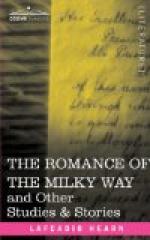I think that my readers ought to be interested in the following selection of ancient Japanese poems, treating of the Tanabata legend. All are from the Many[=o]sh[=u]. The Many[=o]sh[=u], or “Gathering of a Myriad Leaves,” is a vast collection of poems composed before the middle of the eighth century. It was compiled by Imperial order, and completed early in the ninth century. The number of the poems which it contains is upwards of four thousand; some being “long poems” (naga-uta), but the great majority tanka, or compositions limited to thirty-one syllables; and the authors were courtiers or high officials. The first eleven tanka hereafter translated were composed by Yamagami no Okura, Governor of the province of Chikuzen more than eleven hundred years ago. His fame as a poet is well deserved; for not a little of his work will bear comparison with some of the finer epigrams of the Greek Anthology. The following verses, upon the death of his little son Furubi, will serve as an example:—
Wakaker[’e]ba
Nichi-yuki shiraji:
Mahi wa s[’e]mu,
Shitab[’e] no tsukahi
Ohit[’e]-tohoras[’e].
—[As he is so young, he cannot know the way.... To the messenger of the Underworld I will give a bribe, and entreat him, saying: “Do thou kindly take the little one upon thy back along the road."]
Eight hundred years earlier, the Greek poet Diodorus Zonas of Sardis had written:—
“Do thou, who rowest the boat of the dead in the water of this reedy lake, for Hades, stretch out thy hand, dark Charon, to the son of Kinyras, as he mounts the ladder by the gang-way, and receive him. For his sandals will cause the lad to slip, and he fears to set his feet naked on the sand of the shore.”
But the charming epigram of Diodorus was inspired only by a myth,—for the “son of Kinyras” was no other than Adonis,—whereas the verses of Okura express for us the yearning of a father’s heart.
* * * * *
—Though the legend of Tanabata was indeed borrowed from China, the reader will find nothing Chinese in the following compositions. They represent the old classic poetry at its purest, free from alien influence; and they offer us many suggestions as to the condition of Japanese life and thought twelve hundred years ago. Remembering that they were written before any modern European literature had yet taken form, one is startled to find how little the Japanese written language has changed in the course of so many centuries. Allowing for a few obsolete words, and sundry slight changes of pronunciation, the ordinary Japanese reader to-day can enjoy these early productions of his native muse with about as little difficulty as the English reader finds in studying the poets of the Elizabethan era. Moreover, the refinement and the simple charm of the Many[=o]sh[=u] compositions have never been surpassed, and seldom equaled, by later Japanese poets.




